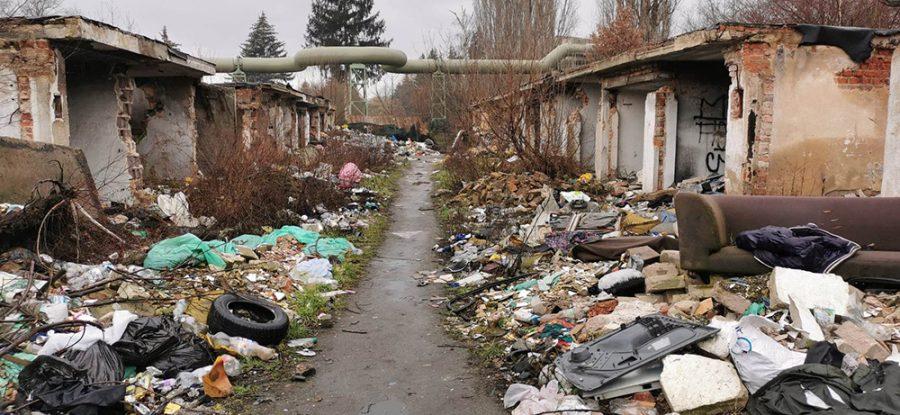Romani woman with no choice but to live in a garage is just one of the harsh realities in this ghetto of the Czech Republic

A Saturday in February in the Předlice quarter of Ústí nad Labem, Czech Republic. Despite the freezing morning, many people are outdoors speaking in half-whispers as firefighter and police vehicles slowly drive through the streets.
There are several media teams filming at the scene. One can smell the oily stench of smoke.
Early this morning the ghetto caught fire again in one of the cottages on the outskirts of this quarter where the poorest of the poor live. It was a big blaze and the flames cost four people their lives this time, two of them young children.
The scene is taped off, the police have erected an investigation tent, and detectives, firefighters and officers with dogs are moving around the site of the fire. The locals do not know who the victims were, some are afraid their own acquaintances or relatives may be among those who burned to death.
Later the information leaks that a young non-Romani family burned to death who had come to Předlice from another city to visit a relative. Why the cottage caught fire that morning, what caused it and how the fire unfolded, will not be clear until the police investigation is over.
Living in a garage
During my walk through the neighborhood I meet Ms. Miriam, whom I have seen before. The middle-aged woman is making an effort to push a shopping cart full of big plastic bags in which she has all her property, and a dog is accompanying her.
“I sometimes spend the night in the cottage area in the summer, I used to get a good night’s rest in one of the old cottages, but it’s already collapsed,” she explains when I ask whether she has ever lived in one of the cottages. “There was a fire this morning like we haven’t seen in a long time in Předlice, people were afraid,” she describes as we slowly walk down Marxova Street.
“I secretly spend the night in the corridors of buildings. Today, early in the morning, somebody came to work and threw me out, so I went to visit my sister who lives in a garage. We could see the fire from there, there was a lot of noise,” Miriam says.
The garages in Předlice are very close to the cottages. They stand facing each other in two rows.
Years ago the garages stopped being used to store cars and Předlice began to change from a regular quarter of the city into an impoverished ghetto. The cars were replaced by human beings who have nowhere else to go.

Iveta, Ms. Miriam’s sister, is the inhabitant who has lived in these garages the longest. She has been in residence here for several years – she isn’t exactly sure how long.
When we leave the yard with its piles of abandoned cars and garbage and enter “her” garage, we are in an absolutely different world. Over the years, Iveta has managed to transform what was once a broken-down garage unit into a cosy, tastefully-appointed, almost-studio apartment.
As we sit down at the table, I take great care not to get mud from my boots on the light-colored carpet even though Iveta assures me it wouldn’t bother her. “I survive here because I have a stove and I don’t freeze, unfortunately there’s no electricity or water here,” she describes her grim life in the garage yard.
“Naturally I’d really like to live in a normal apartment. I’m all alone, though, a Romani woman getting on in years, I haven’t managed to find anything, my only good luck is that my children are already grown up, [caring for young children] would be the biggest problem,” she says.
Surviving another winter
What that “biggest problem” might look like I learn from the story told to me by Iveta’s neighbor from the next garage. “A girl with kids ended up here, she hadn’t been able to pay her rent after her husband had to go to jail,” she tells me.
“Once social services learned there were children here, that she didn’t have an actual permanent address with them, they immediately hurried over here and took the children away, which crushed their mother,” is the point of the story. Ms. Miriam and I then take our leave and push her shopping cart back to the asphalted surface of Marxova Street.
She tells me why she is unable to resolve her situation: She has lost all her personal documents, including her birth certificate. A duplicate birth certificate can only be issued by the municipality in eastern Slovakia where she was born.
Ms. Miriam, of course, does not have the money to make the trip or cover the fees. She probably couldn’t even manage to plan the trip, she’s not used to traveling, she no longer has any ties to Slovakia, her life is in Předlice.
Without those personal documents she cannot register with the Labor Office, apply for financial aid, look for housing, access health care, it’s a vicious circle. At that point her little dog runs off, tempted by a flock of pigeons that has landed in a gap between two buildings.
Before Ms. Miriam heads after him, I ask her what she’s going to do now. Her answer is both desperate and optimistic: “Everything will be fine, I’ve survived another winter.”